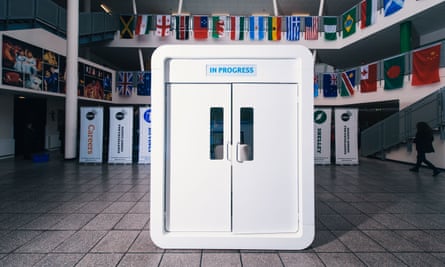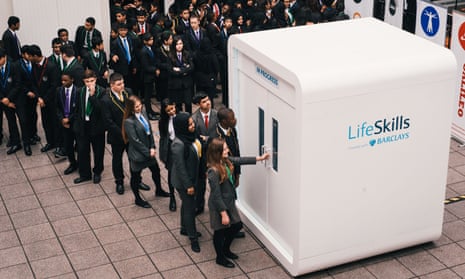At the centre of an east London secondary school hall draped with flags from around the world, and under the motto “aim for excellence”, is a white fridge-like capsule containing two screens and a black chair.
The capsule is called the LifeSkills Pod and is a new initiative described by its creators as “the world’s first immersive work experience simulator”, and as an antidote to the criticism that too many pupils spend all their time making tea when on placements.
Industry experts have said businesses overwhelmingly feel that many young people are not adequately readied for the workplace when they leave education – 88% of businesses believe school leavers are unprepared for the world of work, according to a British Chambers of Commerce survey.
Inside the pod, pupils are given an interactive experience and asked to complete 10-minute tasks covering soft skills such as networking, communicating decisions, resilience and professionalism.

As you step into the pod and the doors shut behind you, you are left to focus on a screen with a fictional colleague welcoming you on your first day of work. You can then pick one of five sectors: administration and law, health and public services, retail and commercial, manufacturing, or business. However, you are not given a stethoscope, a spanner or a till to operate. Instead, you are faced with a series of problems to solve relevant to the place of work.
Anisa, 16, a pupil at Lister Community school in Newham, east London, wants to become either a dentist or neurosurgeon. She selected the health and public services route in the pod. When she completed it, she received a certificate and feedback, breaking down the skills she had or could improve. “I thought it was interesting to have different scenarios, and we learned about other skills people have, like in human resources,” she said, adding: “It’s good to have a virtual experience before we go and do work experience and it strengthens our foundations, such as writing emails.”
Another student, Elijah, 15, dreams of becoming an actor. He said of the pod’s simulated retail experience: “It gave a good scenario of dealing with a bad customer.”

It was difficult to find quality work experience placements for the 270 students in the year group, said Simon Beck, the assistant head teacher of Lister Community school, with some students reporting they only made tea and had not gained any useful skills.
As a result, the school scrapped the work experience placement scheme and replaced it with a world of work week. This includes all the students being given a foundation day in life skills training, working in a social action programme alongside volunteers from banks, repainting benches and building animal shelters in Mile End park, and having the chance to quiz professionals. Students are also encouraged to visit colleges and universities during the week.
“What we found when we got to picking options, is that students were a lot more clued up and colleges have themselves said this,” Beck said. “In previous years, on career days students went around picking up freebies from stalls. But this time the students went straight to the people they were interested in.”

In fact one of his students, Daiana, managed to get work experience with a bank after meeting employees during the world of work week last summer and has been offered a job with the company when she completes her GCSEs.
The LifeSkills Pod, created with Barclays, will be at the school for a week and will then tour careers events. It will be made available more widely through a website to help young people across the country, as well as providing teachers and career advisers with resources to inspire their students.
Kirstie Mackey, the head of LifeSkills at Barclays, said: “We can’t predict jobs of the future but we can predict the skills that young people will need in an ever-changing workplace. “We have started to incorporate skills such as problem solving, communication and resilience within the programme through experiences such as the LifeSkills Pod.”
